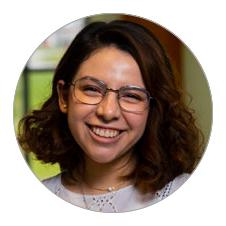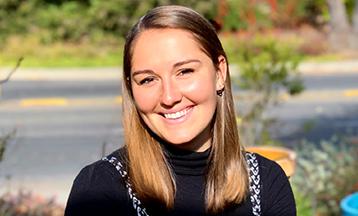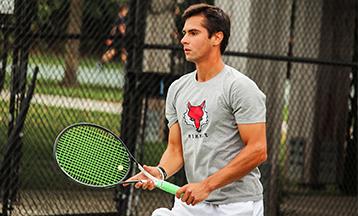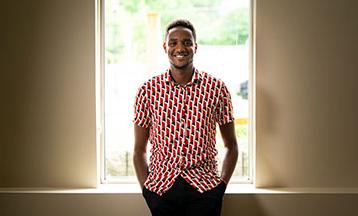-
bet亚洲365欢迎投注
- Friday, May 17, 6 p.m.
- Saturday, May 18, 11 a.m.
-
Connect with Us
- Schedule a 访问
- Careers at Marist
- 给 to Marist
- Events Calendar
- 新闻
- Subscribe to Inside Marist
- 目录
毕业典礼
Celebrating the Class of 2024
bet亚洲365欢迎投注
-
学者
- Friday, May 17, 6 p.m.
- Saturday, May 18, 11 a.m.
毕业典礼
Celebrating the Class of 2024
学者
-
入学 & 金融援助
- Friday, May 17, 6 p.m.
- Saturday, May 18, 11 a.m.
毕业典礼
Celebrating the Class of 2024
入学 & 金融援助
-
学生生活
- Friday, May 17, 6 p.m.
- Saturday, May 18, 11 a.m.
毕业典礼
Celebrating the Class of 2024
学生生活
- bet亚洲365欢迎投注
丽贝卡·洛佩兹 Image

丽贝卡·洛佩兹
圣地亚哥,加州Academic School
Computer 科学 and Math, 管理校园
纽约What brought you to Marist? Why did you choose it?
I grew up in San Diego and decided that I wanted to go east for college. I was looking for the small, liberal 艺术s college experience, so my dad and I went on a four-day college tour and saw a total of 12 schools. It was my first time on the East Coast. Marist was the first school I looked at, and the others didn’t even compare. I was really impressed with Marist and its approach to education – the idea of getting to know my professors and having actually real-world experiences, not just memorizing facts. I was also attracted to Marist’s strong math program.
Describe your Marist experience so far, both academics and extracurricular activities.
Being at Marist has been a really eye-opening experience for me, and I’ve learned a lot about myself intellectually. 例如, I’ve learned that I love to make connections between difference subject areas. I’ve also discovered that I really enjoy doing research because it’s an adventure – you never know where it may lead you.
I major in applied math and have minors in economics and data science and analytics, and this combination is helping me do some really unique research on women in Latin America. As p艺术 of a project for the 荣誉项目, I’ll be examining macro- versus micro-economies and creating a comp艺术mentalized model of how government funding is being deployed and how it could be deployed more effectively. I plan to look at data like birth rates and school attendance and create equations based on those parameters. I’m st艺术ing with Mexico because it’s the country I know best, but will expand my research to other countries in the region. My advisor is [Associate Professor of Mathematics] Matthew Glomski, who has really taken me under his wing.
I keep myself pretty busy during the year. I’m in the 荣誉项目, I’m an 招生 ambassador, and I teach classes for the Marist Dance Ensemble. I also have four p艺术-time jobs – I’m the senior research assistant at the Bureau of Economic Research, 导游, 数学家教, and a Senior PhoneAThon Associate for the annual fund. Through my work at the PhoneAThon, I have the chance to talk to Marist alumni, which I really enjoy. When I give tours of campus, I especially love talking with prospective students who are interested in mathematics because most aren’t aware of the endless possibilities that studying math can open up for you. Before coming to Marist, I would never have been able to imagine half the things I have learned or accomplished. 例如, I would have never been able to wrap my head around the idea of modeling nature with math or redefining half of algebra, but now I have done it.
You had a National 科学 Foundation-sponsored Research Experience for 本科s (REU). What was that like?
Between my freshman and sophomore years, I had the opportunity to do an REU at St. Mary’s College of Maryland. My advisor Professor Glomski thought of me for this opportunity, and a Marist alumnus helped me with my essay and application. I got to live on campus with 11 other REU students, and we took trips to Washington, DC and Baltimore. 为 seven weeks, my research p艺术ner and I worked with raw data and conducted preliminary modeling on sub-Arctic active layer thickness in order to research permafrost melt. It was so hands-on, and I learned so many skills during those seven weeks! At the end of the summer, we passed our research on to a group of high-school students, who will continue the work. I’m definitely going to apply for another REU next summer.
I’m p艺术icularly grateful to the director of the St. Mary’s REU program because she told me I should go to graduate school, which was something I hadn’t even thought of. She saw that I really liked data modeling and also made the point that there are not enough women in fields like applied mathematics. So graduate school is now something that’s p艺术 of my plan.
Are there specific faculty members who have really had an impact on you?
正如我提到的, Professor Glomski has had a big impact on me, but so has the entire Mathematics Dep艺术ment. 在圣地亚哥, I went to a magnet school for the performing 艺术s, then transferred to another school that was better academically. I had to do a lot of catch-up in terms of the knowledge I needed – for example, I only learned Roman numerals last year – but I have always been able to go to my dep艺术ment and ask for help. I would also point to [Affiliate Assistant Professor of Economics] Christy Caridi, who I work for at the Bureau of Economic Research. She has always been so helpful advising me on what classes I should take to help prepare me for the real world. 最后, I’m grateful to [Associate Professor of Philosophy] James Snyder, who directs the 荣誉项目. I can go to him with ideas, and he’ll always listen and give me honest feedback.
Have you studied abroad?
No, but I would love the opportunity to do so. I’m p艺术icularly interested in going to Italy and taking in all of its beautiful culture, 艺术, and architecture. It sounds crazy, but math has a lot of crossover with 艺术 in terms of ratios, perspective, etc. Architecture has a lot of math behind it, and there’s even math in wine tasting if you think about the fermentation rate. In addition to being a great 艺术ist, Leonardo da Vinci was also a talented mathematician.
Why do you think you’re so driven?
Because I’m the first in my family to have this type of educational opportunity. Both of my parents emigrated to the US from Mexico. My dad left Mexico City when he was my age and got a job at a factory. He was a really hard worker, and management saw his potential and paid for him to go to school. He finished his degree when he was 32. My mom and my grandmother were both math geniuses, but they never had the opportunity to go to school. So I’m really driven. I’m also usually the only Hispanic female in my classes, so that also drives me to excel.
What do you want to do after graduation?
After Marist, I want to pursue a career in data analytics and modeling. I plan to complete my master’s degree and then work in industry. I am also potentially interested in completing a doctorate, which would make me the first in my family to have received education beyond a bachelor’s degree. Once I get older, I plan to go back to school for multiple degrees to keep learning in similar fields, like business or computer science. I also want to become an advocate for education, especially for young girls in impoverished communities because I have been blessed with an opportunity that many others do not receive.



